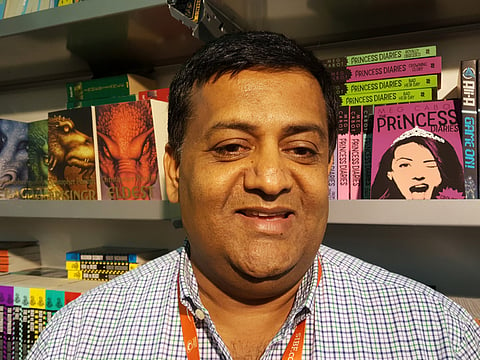Publishers embracing, not fleeing, technology
Exhibitors at Sharjah International Book Fair downplay idea of digital dominance

Sharjah: New technology and digital content is viewed by book publishers more as an opportunity rather than a threat, said exhibitors at the Sharjah International Book Fair (SIBF), which opened on Wednesday.
Print on Demand (POD), for example, allows publishers to print small orders of books at a fraction of the cost compared to using plates and ink designed to print thousands of copies at a time in a bulk run.
Meanwhile, a lot of digital content, especially in the academic field, is provided to complement rather than compete with books, SIBF exhibitors said. They also played down the view that traditional paper books are getting squeezed out of the market by electronic books.
Ravi D C, CEO of DC Books, a major publisher in India that is also “probably the second largest POD publisher in India”, said the turnaround time to print extra books is much faster with POD. DC Books does about 100-plus POD titles a month.
POD is cheaper as well, D C added, costing a fraction of a regular print run. It also offsets the risk of printing a large number of books that eventually remain unsold because of weak demand.
“We do an estimation. When we realise the book is out of print, but it still has a market demand, but the market can just push, say, 200 copies a month, then you POD that 200 extra copies for two or three months. Or you decide not to print at all because the numbers in demand are too low [to make printing financially viable],” he explained.
Bill Kennedy, director of Avicenna, an exhibitor at the UK pavilion at SIBF, said: “Publishers are moving towards a [business] model where they are reducing inventory. If people want to buy a certain title, these books are then POD. The quality of output POD is fantastic, and it outputs into a paperback or hardback binding line.”
Kennedy added: “Imagine a publisher who estimates they need 4,000 copies. If they get it wrong, either printing too few or too many books, it’s a costly mistake. So with the POD model — which, granted, is a more expensive production method — you offset that against your inventory cost and making a goof up.”
POD orders can be as small as one copy, he said.
Education priority
At the stand of the US Embassy at SIBF, a number of publishers specialised in academic books are being promoted. Barbara A. Leaf, US ambassador to the UAE, said: “The thought that we had coming into [the book fair] this year was doing something a bit different, which was to focus on our educational publishers.”
The US Embassy in the UAE has been participating for 35 editions of SIBF, which is now in its 36th edition.
Leaf added: “Our idea was to link up with both the [UAE] national and emirates’ leaderships’ priority goals, which are rebooting education, modernising their curriculum, helping their next generation of students to truly get behind the slogan of ‘global citizens’. And what better way to do that than being introduced to American curricula and educational research, and we wanted to showcase that and our publishers.”
The UK is the Guest of Honour at SIBF this year.



